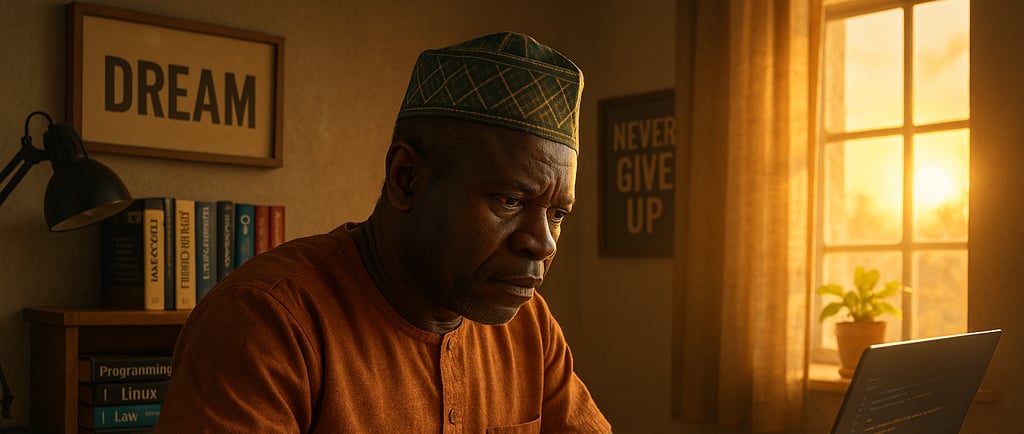
From Sales to Software
A Story That Proves It's Never Too Late to Start
Shane Brown
7/9/20256 min read


From Sales to Software: A Story That Proves It's Never Too Late to Start
I want to share a story with you today that I find incredibly moving and powerful. It's about someone who reminds us that our timelines don't have to look like everyone else's, and that sometimes the most meaningful journeys begin when we least expect them.
When Life Calls for a Bold Move
Meet a remarkable professional from Nigeria who, at 41, decided to completely reinvent his career. This wasn't a young graduate making their first career choice, this was a seasoned professional with over a decade of experience in sales, someone who had built a solid reputation and could have easily continued on his established path.
But here's what struck me most about his story: he didn't just want to change careers; he wanted to solve harder problems. As he put it, "if you want an easier life, learn to solve harder problems." That philosophy became the foundation of everything that followed.
The Spark That Started It All
What I love about this journey is that it wasn't entirely out of nowhere. Back in 2002, he had written his first HTML and CSS code, but like many of us, life took him in different directions. Sometimes the seeds of our future selves are planted much earlier than we realize.
The real catalyst came from two life changing moments: becoming a father in July 2023, which gave him powerful motivation to build something meaningful for his family, and experiencing a significant setback when his car was stolen in December 2022. Instead of letting this derail him, he adopted what he called a "do or die" mentality, knowing that the future rewards would far surpass any temporary losses.
The Game Plan: Learning Like Your Life Depends on It
Here's where his story gets really practical and inspiring. He approached learning to code the same way he had mastered fitness, with unwavering consistency and discipline. Since 2020, he had been hitting the gym at least three times a week, and he recognized something crucial: both tech and fitness are "romanticized and filled with hype, many start, but fewer than 10% follow through."
His Learning Journey (Step by Step):
Phase 1: Building the Foundation (April-June 2022)
Spent two solid months refreshing HTML & CSS fundamentals
Used this time to rebuild confidence and establish study habits
Phase 2: JavaScript Deep Dive (Mid to Late 2022)
Focused intensively on JavaScript
Built projects and shared them with friends for honest feedback
Started treating coding as a daily practice, not just a hobby
Phase 3: Modern Development Stack (Early 2023)
Expanded to React, Next.js, TypeScript, and Tailwind CSS
Began building more complex, real-world applications
Phase 4: Technical Interview Prep (November 2023)
Started daily LeetCode practice
Developed problem solving skills that employers actually test for
Phase 5: Backend Development (Late 2023)
Learned Node.js, Express, and MongoDB
Became a full-stack developer who could build complete applications
Phase 6: Real-World Experience (Early 2024)
Secured an unpaid internship that provided invaluable hands-on experience
Sometimes the best opportunities don't come with immediate paychecks
Phase 7: Advanced Skills (Mid 2024)
Mastered SQL, relational databases, ORMs, API development, testing, and authentication
Built the comprehensive skill set that modern companies require
Phase 8: First Income (Q3 2024)
Started earning money by converting Figma designs to code
Proved to himself and others that his skills had real market value
Phase 9: Job Search Success (Q4 2024)
Intensive interview phase while continuously improving his skills
Never stopped learning, even while actively job searching
The Resources That Made It Possible
One of the most practical aspects of his story is how he built world class skills without breaking the bank. He carefully selected resources that provided maximum value:
Free Learning Platforms That Changed Everything:
freeCodeCamp: Comprehensive interactive curriculum that guided his early steps
Codecademy: Structured courses that built his confidence
Scrimba: Interactive video-based learning that made complex concepts click
YouTube: Deep-dive tutorials and insights from industry experts
The Odin Project: Career guidance and a clear roadmap forward
As his skills grew, he transitioned to using official documentation a crucial milestone that showed he was thinking like a professional developer.
Making Tech a Lifestyle, Not Just a Job
What sets his story apart is how completely he immersed himself in the tech world. He didn't just learn to code; he became part of the community:
Participated in Mark Essien's HNG Internship for structured learning
Joined multiple Chingu cohorts for pair programming and team projects
Engaged actively in tech spaces on Twitter for networking and discussions
Watched tech-focused YouTube channels for industry insights
Participated in Discord & Telegram coding communities for daily learning
Used AI tools to accelerate his learning and productivity
Built hobby projects and wrote technical articles to solidify his knowledge
He strategically optimized his social media to center around tech, creating an ecosystem of learning and motivation that supported his transformation every single day.
The Real Talk: Challenges Nobody Talks About
I appreciate how honest he was about the difficulties, because I think it's important for anyone considering this path to understand what they're really signing up for:
Age Reality: At 41, he was often the oldest person in his workplace. Rather than seeing this as a limitation, he stayed humble and focused on proving his capabilities through his work.
Financial Pressure: The transition required extreme sacrifices, dedicating most of his time to learning while maintaining other income sources. He recommends expecting 1-3 years before tech earnings can sustain you completely.
Rising Standards: The bar for entering tech has risen dramatically. Skills that might have landed a job in 2016 now require "at least 10 times more" knowledge to be competitive.
Market Realities: He prepared for potential challenges, especially in markets where technical talent is abundant, but kept his focus on long term goals.
The Breakthrough Moment
After two and a half years of dedicated learning and growth, persistence finally paid off. On January 6, 2025, at age 41, he officially started his first paid position as a software engineer.
Here's the beautiful irony: the same company that hired him had previously rejected him for a volunteer position. Sometimes rejection is just redirection toward something better.
His Final Application Timeline:
November 16, 2024: First application to the company (rejected)
December 25, 2024: Reapplied to the same company (Christmas Day determination!)
December 27, 2024: First interview
December 31, 2024: Completed take home test
January 3, 2025: Review session
January 6, 2025: Started work on a three month contract
The Lessons That Matter Most
His journey offers wisdom that extends far beyond coding:
1. Embrace the Long Game: Learning to code is really two journeys, becoming skilled enough to land your first job (often the hardest part) and committing to lifelong learning to grow and stay relevant.
2. Manage Your Expectations Wisely: Be skeptical of anyone promising instant results. Real success takes time, often a couple of years, to find balance and stability.
3. Build Multiple Safety Nets: Diversify your income sources to reduce reliance on any single opportunity, especially during the learning phase.
4. Focus on What You Can Actually Do: Web development isn't about certificates on your wall, it's about demonstrable skills and practical experience that solve real problems.
5. Make It Your Daily Reality: True mastery comes from making programming a daily practice, not just a career goal you work toward occasionally.
Why This Story Matters Right Now
This success story comes at a challenging time for the tech industry. We're seeing layoffs, shifts in remote work policies, and AI driven automation changing how companies operate. But here's what gives me hope: there are still incredible opportunities for those willing to persist and adapt.
For developers in emerging markets, lower operational costs can make them attractive partners for global companies. And as this story shows, individual determination and skill development can overcome market challenges.
The Bigger Picture: Multiple Paths to Success
What excites me most about this story is how it demonstrates that software development offers multiple pathways to build a meaningful career:
Freelancing: Platforms like Upwork provide access to global clients
Remote Work: High-paying positions with international companies
Immigration Opportunities: Tech skills can facilitate relocation as skilled workers
Entrepreneurship: Building solutions for local and global markets
The Support System That Made It Possible
Throughout his journey, he acknowledged the crucial support from family and mentors. His wife made the journey possible "in every way," while colleagues and friends provided guidance, encouragement, and real world opportunities.
This reminds us that career transitions aren't solo journeys, they're community efforts that require and deserve support from the people who believe in us.
What This Means for You
If you're reading this and considering a similar transition, I want you to know something important: this story isn't unique because it's impossible to replicate. It's inspiring because it's absolutely achievable for anyone willing to commit to the process.
At 41, with family responsibilities and financial pressures, this professional proved that it's possible to completely reinvent your career through determination, strategic learning, and unwavering commitment.
Your Journey Starts When You're Ready
The most powerful message in this story isn't about age, background, or perfect timing. It's about the decision to start, the commitment to continue, and the belief that you can learn and grow beyond what you thought possible.
Whether you're 21 or 51, whether you're coming from sales, teaching, healthcare, or any other field—your background isn't a limitation. It's the foundation for the unique perspective you'll bring to technology.
The question isn't whether you're qualified to start. The question is whether you're ready to begin.
If this story resonates with you, if you've been thinking about making a change, or if you know someone who needs to hear this, remember that every expert was once a beginner, every success story started with a single decision to try, and every transformation began with someone who decided their current chapter didn't have to be their final one.
Your timeline is your own. Your journey is valid. And if you're ready to start, the tech community is ready to welcome you home.
